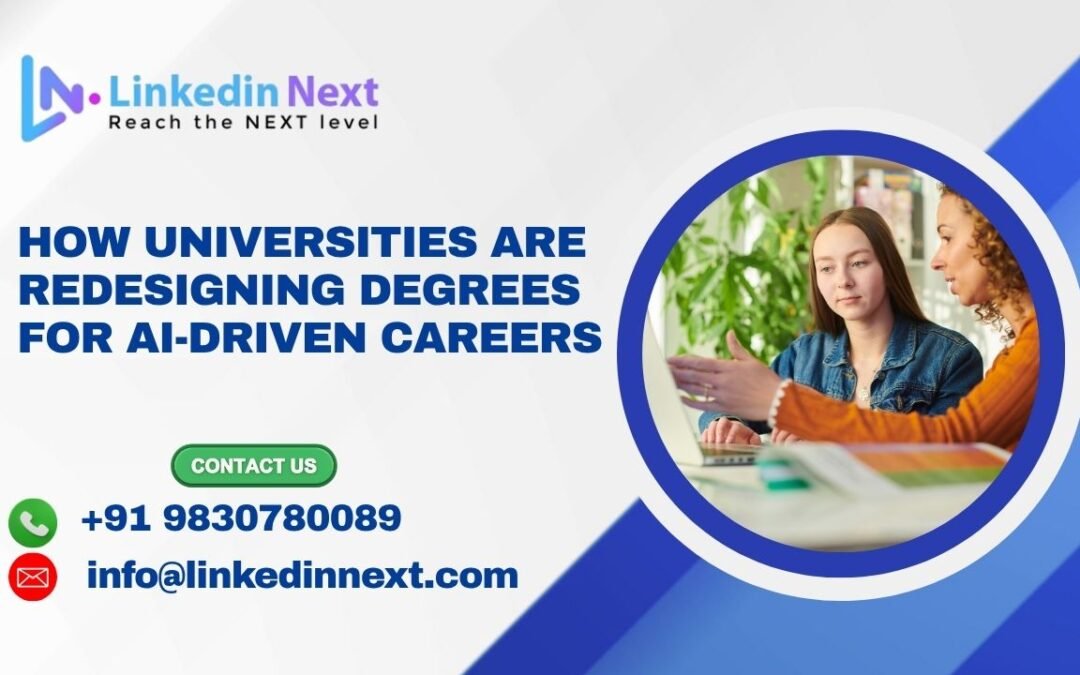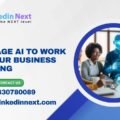How Universities Are Redesigning Degrees for AI-Driven Careers
How Universities Are Redesigning Degrees for AI-Driven Careers. As artificial intelligence continues to reshape global industries, universities are evolving at an unprecedented pace to prepare students for a world where human potential and machine intelligence must coexist. The traditional degree model—once built around rigid academic silos—is being reimagined to match the agility, interdisciplinarity, and data-centric nature of the modern workforce. Across the globe, higher education institutions are integrating AI literacy, computational thinking, and digital transformation strategies into their core academic frameworks.
The Shift from Traditional Learning to AI-Centric Education
In the past, university education emphasized theoretical understanding and domain-specific expertise. Today, the AI revolution demands adaptable, tech-fluent graduates capable of merging creativity with computational intelligence. To achieve this, universities are:
-
Embedding AI and data science modules into non-technical degrees like business, healthcare, and humanities.
-
Introducing cross-disciplinary learning where engineering meets psychology, ethics meets computing, and design meets automation.
-
Prioritizing hands-on experience with real-world AI applications, including predictive analytics, machine learning, and generative AI tools.
For instance, top universities such as MIT, Stanford, and Oxford are launching AI-integrated curriculums that blend technical skills with critical thinking, ethics, and social responsibility.
Emergence of Interdisciplinary AI Programs
One of the defining trends in higher education is the creation of hybrid degree programs that cut across traditional academic boundaries. Students can now pursue AI-driven degrees such as:
-
AI and Cognitive Science – exploring how machine learning mimics human thought.
-
AI in Business Analytics – combining computational intelligence with strategic decision-making.
-
AI and Ethics – focusing on the responsible use of data and automation in society.
-
AI and Healthcare Informatics – leveraging predictive algorithms for clinical decision-making.
These new programs reflect a broader recognition that AI is not a standalone discipline, but a powerful tool that enhances every field. Universities are thus shifting from producing narrow specialists to nurturing adaptive, AI-savvy professionals ready for dynamic industries.
Industry Collaboration: Bridging Academia and Real-World AI Applications
Forward-thinking universities understand that the gap between academia and industry must narrow to keep education relevant. Hence, collaboration with tech giants and AI startups has become a cornerstone of curriculum redesign.
Through partnerships with companies such as Google, IBM, Microsoft, and NVIDIA, universities are enabling students to:
-
Engage in live AI projects, simulations, and internships.
-
Access AI research labs equipped with high-performance computing resources.
-
Gain exposure to AI ethics frameworks, coding environments, and automation systems used in real enterprises.
This symbiotic relationship ensures that academic learning translates into employable AI competencies—a crucial factor in today’s data-driven job market.
Integration of AI Tools in Learning Environments
Beyond the curriculum, universities are transforming how learning itself is delivered through AI-powered tools. Intelligent tutoring systems, adaptive learning platforms, and chatbots are personalizing education at scale.
Examples include:
-
AI-driven assessment systems that provide instant feedback and learning recommendations.
-
Virtual labs and simulations that allow students to experiment with complex AI models.
-
Predictive learning analytics that identify at-risk students and suggest interventions.
Such innovations mark a shift toward personalized, data-informed pedagogy, allowing learners to progress at their own pace while ensuring mastery of critical AI-related concepts.
Ethics and Responsible AI Education
As automation grows, so does the importance of AI ethics education. Universities are incorporating modules on bias detection, transparency, data privacy, and algorithmic fairness. Students are encouraged to question:
-
How should AI systems make moral decisions?
-
Who is accountable when AI makes mistakes?
-
What safeguards are needed to prevent misuse of data?
These questions are at the heart of emerging programs in AI Governance, Digital Ethics, and Responsible Innovation. By teaching the ethical dimensions of technology, universities are preparing graduates to shape an AI future that is equitable, sustainable, and human-centered.
The Rise of Micro-Credentials and Lifelong Learning
The rapid pace of AI advancement means that skills can become outdated within years—or even months. Universities are addressing this challenge through modular learning pathways and micro-credentials.
These shorter, skill-specific certifications allow professionals to reskill or upskill quickly in areas like:
-
Machine learning and neural networks
-
Data visualization and AI-driven analytics
-
Natural language processing
-
AI-powered project management
By embracing continuous learning models, universities are supporting lifelong employability in a labor market where AI literacy is no longer optional.
Redefining Faculty Roles and Academic Research
Faculty members are also evolving from traditional lecturers to AI mentors and innovation facilitators. Many universities are investing heavily in AI research clusters, fostering collaboration among computer scientists, sociologists, economists, and artists to explore how AI reshapes human experience.
Research areas gaining traction include:
-
AI in climate modeling and sustainability
-
Generative AI in art, music, and literature
-
Predictive analytics in economics and policy planning
-
AI-driven medical diagnostics and drug discovery
By merging academic research with real-world impact, universities are reinforcing their role as innovation engines for the AI economy.
Preparing Students for AI-Driven Careers
The future workforce will demand individuals who can collaborate effectively with intelligent systems. Universities are aligning their degree outcomes with the most in-demand AI-era career paths, including:
-
AI Product Manager
-
Data Scientist and Analyst
-
Machine Learning Engineer
-
AI Ethics Consultant
-
Automation Strategist
-
Digital Transformation Specialist
Through experiential learning, AI hackathons, and project-based assessment, students graduate with not only theoretical knowledge but also portfolio-ready, industry-relevant experience.
Global Trends in AI-Integrated Higher Education
Globally, several educational systems are setting benchmarks in AI curriculum innovation:
-
United States: Universities emphasize AI entrepreneurship and applied machine learning.
-
Europe: Focus on ethics, regulation, and AI for social good.
-
Asia: Rapid integration of AI in engineering and digital infrastructure education.
-
Australia & Canada: Promoting interdisciplinary AI research for sustainability and innovation.
This global convergence shows that AI education is no longer confined to computer science departments—it is becoming the foundation of all professional disciplines.
Conclusion: The Future of Higher Education in the AI Age
As we stand at the intersection of technology and humanity, universities are no longer just institutions of learning—they are ecosystems of innovation. The redesign of degree programs around AI is not merely an academic trend but a profound transformation of how society cultivates intelligence, creativity, and ethics in the digital age.
By fostering AI readiness, interdisciplinary collaboration, and lifelong learning, universities are ensuring that graduates don’t just survive in the AI-driven world—they lead it.
Thank you for read our blog “How Universities Are Redesigning Degrees for AI-Driven Careers”.
Also read our more BLOG here.
I hope this blog is helpful to you, if you have any question feel free contact us at
Call/WhatsApp: +91.9830780089 || Email: info@linkedinnext.com







Recent Comments